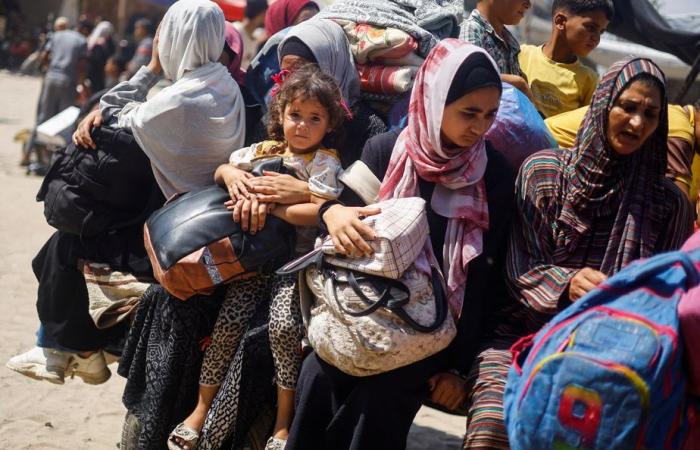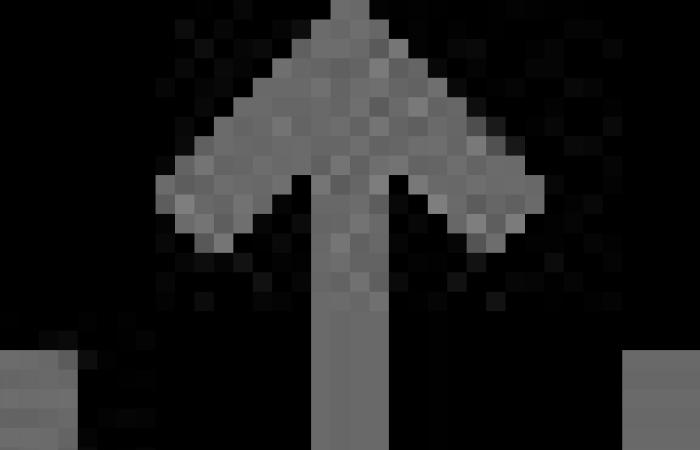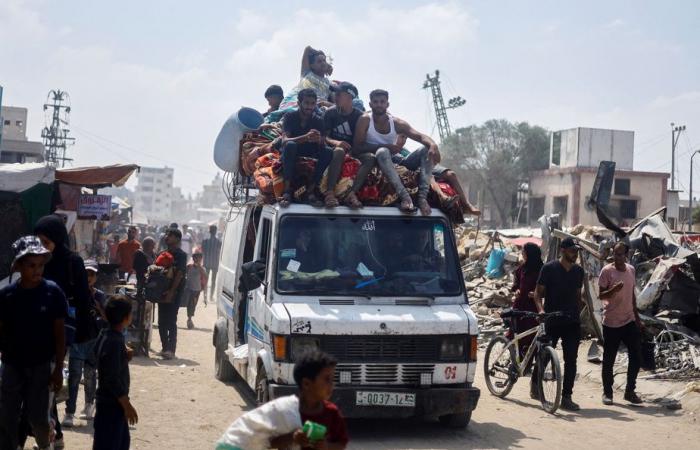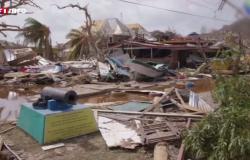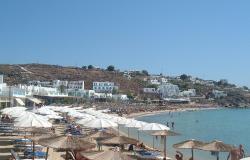The Israeli army bombed the Gaza Strip on Tuesday, devastated by nearly nine months of war, particularly the south of the besieged Palestinian territory where it gave new evacuation orders, which concern “around 250,000 people” according to the UN.
Posted at 6:28 a.m.
Updated at 8:25 a.m.
“We’ve seen people moving, families moving, people starting to pack up,” Louise Wateridge, a spokeswoman for the U.N. refugee agency (UNRWA), told reporters in Geneva via video link from Gaza.
UNRWA “estimates that around 250,000 people have been affected by these orders,” it added.
Meanwhile, the Israeli army says it is continuing its operations in Shujaiya, in the center of the Gaza Strip, as well as in Rafah, in the south of the Palestinian territory, where it gave new evacuation orders to the population on Monday.
AFP footage showed displaced families amid the ruins of the town of Khan Younis, fleeing once again on foot or crammed onto trailers.
In addition to the mass displacement, the war, which began on October 7 with an unprecedented attack by the Palestinian Islamist movement Hamas on Israeli soil, has caused a humanitarian catastrophe in the cramped territory where 2.4 million people live in “dire” conditions, according to the UN.
After launching a ground offensive on October 27 in the north of the Gaza Strip, the Israeli army gradually moved towards the south where it launched a ground operation on May 7 in Rafah, a town on the border with Egypt, then presented as the final stage of the war, forcing a million Palestinians to flee, according to the UN.
But in recent weeks, fighting has intensified again in several regions that the army had said it controlled, particularly in the north of the territory.
“No place to stay”
The new evacuation orders issued by the Israeli army in the southern Gaza Strip came after the Islamic Jihad, another Palestinian armed group, claimed responsibility on Monday for rocket fire into Israel.
The army said it had targeted the source of the shots, in the vicinity of Khan Younis.
PHOTO MOHAMMED SALEM, REUTERS
A patient on a stretcher at Nasser Hospital in Khan Younis.
Palestinian medical sources reported at least eight dead and more than thirty injured in Israeli bombings in Khan Younis and Rafah.
The Israeli army also announced the death of two soldiers on Monday in the centre of the Gaza Strip, bringing to 319 the number of soldiers killed since October 27.
In the north, the army says it is continuing its operations launched on June 27 in Choujaïya, claiming to have eliminated “numerous terrorists” there.
An AFP correspondent reported on Tuesday new bombings on this district in the east of Gaza City.
According to the UN, between 60,000 and 80,000 people have fled the bombings and fighting in Shujaiya in recent days.
“We fled Shujaiya. The situation is very difficult. We have no place to stay,” said a Palestinian who sought refuge in western Gaza City.
The Israeli army’s offensive in the Gaza Strip has killed 37,925 people since October 7, mostly civilians, according to data from the Health Ministry of the Hamas-led Gaza government.
It was launched after the Hamas attack, which resulted in the death of 1,195 people, mostly civilians, according to an AFP count based on official Israeli data. Of the 251 people kidnapped during the attack, 116 are still being held hostage in Gaza, of whom 42 are dead, according to the army.
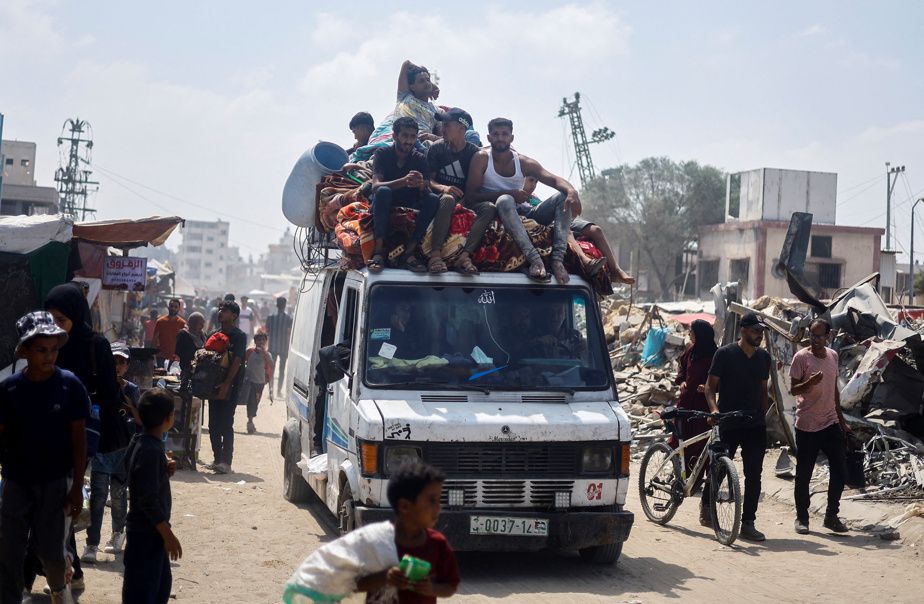
PHOTO MOHAMMED SALEM, REUTERS
Palestinians flee Khan Younis.
Accusations of “torture”
Israeli Prime Minister Benjamin Netanyahu said more than a week ago that the “intense” phase of the war was coming to an end.
“We are moving towards the end of the phase of eliminating the terrorist army of Hamas” in power in the Gaza Strip since 2007, he said again on Monday.
“We have heard from the Israelis that there has been a significant decline in their operations. […]”That remains to be seen,” responded the head of American diplomacy Antony Blinken.
On Monday, dozens of Palestinian prisoners, including the director of Gaza City’s al-Shifa hospital, Mohammed Abu Salmiya, were released by Israel and transferred to hospitals in Gaza, according to a medical source.
Mr Salmiya said he was subjected to “severe torture” during his seven months in detention. “Prisoners are subjected to all kinds of torture,” he charged. “Many prisoners have died.”
In Israel, Mr Netanyahu denounced the release as a “grave mistake”, saying that “the place of this man, under whose responsibility our hostages were killed and held, is in prison”, with the Shin Bet (Internal Security) citing a means “to free up space” in prisons.
Israel says it has connected a desalination plant to its electricity grid
Israel, which is imposing a siege on the Gaza Strip, announced Tuesday that it had connected a desalination plant run by UNICEF in the south of the territory to its electricity grid.
“A new power line from Israel has been directly connected to a water desalination plant in Khan Younis,” said a statement from the Israeli army and Cogat, the Israeli Defense Ministry’s branch that oversees civilian activities in the Palestinian Territories.
Asked by AFP, the army did not specify when the electricity would be connected.
“We still have not received electricity, but we are preparing for the possibility that[Israël] “Activate the line,” a source at the Gaza electricity distribution company told AFP on Monday evening, indicating that they were repairing the main power line in Khan Younis in anticipation.
On Thursday, the United Nations Children’s Fund (UNICEF) said it had reached an agreement with Israel to restore electricity to the Khan Younis desalination plant.
“This is an important step and we look forward to seeing it come to fruition,” Jonathan Crickx, UNICEF spokesman in the Palestinian Territories, told AFP.
The need for drinking water is considerable in the Gaza Strip, ravaged by nearly nine months of war between the Israeli army and the ruling Hamas.
Following the Hamas attack on Israeli soil, Israeli Defense Minister Yoav Gallant announced on October 9 that he was imposing “a complete siege” on Gaza: “No electricity, no water, no gas.”
Since then, the humanitarian situation for the 2.4 million inhabitants has deteriorated considerably, according to NGOs on the ground.
“Currently, the (Khan Younis) plant produces only 5,000 cubic meters of water per day. Thanks to the new power line from Israel, the plant’s production will increase to 20,000 cubic meters of drinking water per day,” Israeli authorities said.

